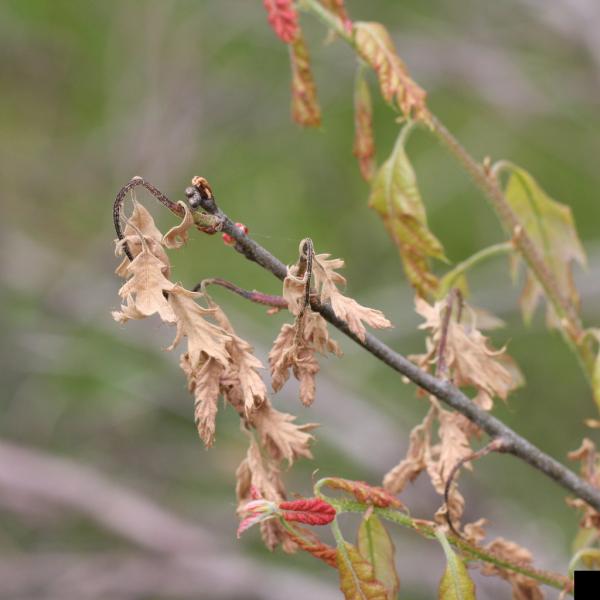
Author: VT Department of Forest Parks & Recreation (FPR), Forest Health
Source: Insect and Disease Observations, May 2023
Unusually cold temperatures across the state were recorded from May 17-18, with lows reaching the mid to lower 20s in some places. At the same time, many tree species were either just beginning to break bud and/or undergoing leaf expansion, a process that was recorded as being notably earlier than in 2022 (data from April’s Insect and Disease Observations). These early leaf stages are particularly vulnerable to sudden drops in temperature, and as a result, many locations experienced foliar necrosis (browning) and premature leaf drop.
Public reports and staff observations recorded damages across the state from Highgate to Halifax, with cold pockets and river valleys seeing the most extensive damage. Most reports of freeze damage in forests stated damage to members of the Fagaceae family, including American beech (Fagus grandifolia) and red oak (Quercus rubra) regardless of geographic location. In the northeast, reports also included black walnut (Juglans nigra) and white ash (Fraxinus americana); in the northwest, reports also included black locust (Robinia pseudoacacia), staghorn sumac (Rhus typhina) and white ash were also reported; in the southwest, reports also included black locust, butternut (Juglans cinerea), and staghorn sumac; and in the southeast, reports also included hickory (Carya spp.), sugar maple (Acer saccharum) and white ash.
FPR staff have assessed damage over a small portion of the state through aerial detection surveys and will continue to document the damage in the coming weeks. Since this freeze event happened so early in the growing season, it’s likely that otherwise healthy trees will be able to re-leaf, however, these new leaves may be smaller and lighter in color, causing the canopies to look thinner this year. If you would like to contribute to our data and understanding of the extent and impact of this freeze event and have not yet reached out to FPR staff directly, you can submit your observation using this form: May Freeze Event.